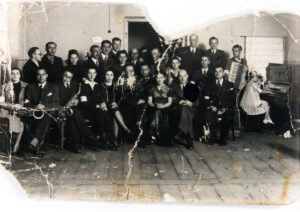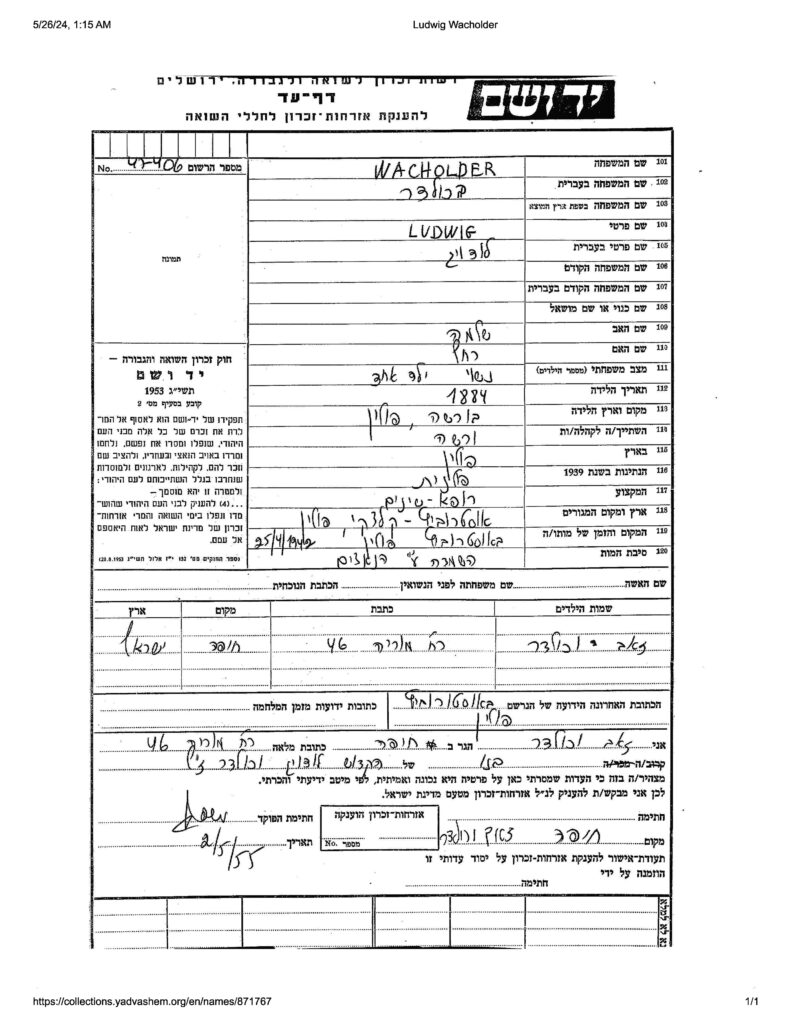
Ludwik Wacholder
A councilman, a dentist, a citizen
![Ilzecka 38- Google maps 2019 Ilzecka 38- Home of Ludwik Wacholder until his murder [Google maps 2019]](https://jewsofostrowiec.com/wp-content/uploads/2024/05/Ilzecka-38-Google-maps-2019.jpg)
Introduction
Ludwik Wacholder was born on March 14, 1884 in Warsaw to Szlama Abram and Rachela (Tartar) Wacholder. His marriage to Zyssa Margulies was registered in 1911 in Opatow. They lived on Ilzecka 38. The 1942 Raptaluz registered that he was shot dead on April 28 1942, one of 36 victims of the Nazi slaughter that day
[Above details courtesy of JRI-Poland.org and Judy Golan, JRI-Poland Ostrowiec Town Leader]
His son Zeev Wacholder survived and moved to Israel after the Holocaust. The fate of his wife is not known.
Ludwik's noble character of his assisting refugees both after the first World War and during the Holocaust ,has been documented in 2 Yizkor Book articles below:
---------------
The harsh period of the 1915 winter began with the deportation of the Jews from the nearby towns of Szewna, Lipsk and Tarla. The Jewish refugees were gathered in our city… the town's Jews tried to help the refugees with anything they could. A committee for refugee aid was formed that helped find housing for them, and a public kitchen was established, to make sure they did not go hungry… The city's Jews helped them get settled and rebuild their businesses. Jews of America also lent out a hand and representatives of the American aid council travelled to Ostrowiec to learn what form of help was asked of them. Dr. Wacholder, may he rest in peace, and myself were chosen as representatives of the Jews in the American council in our town, and Yaakov Mendel Goldfinger was chosen as substitute. Dr. Wacholder, who was known for his noble traits, and worked hard to help the refugees, was killed in the holocaust. … [Ostrowiec Yizkor Book 1971, "Ostrowiec, the Town where I Grew up", by Simcha Mintzberg (page 125) ]
------------------------
At the beginning of December 1939, the Ostrowiec Jewish committee was called to the head of the “Gestapo” to inform them that a transport of Jews was passing through Ostrowiec who had not eaten for a few days, and that they were given permission to distribute food to them. …. We took the 1200 Jews into the Ostrowiec Mizrachi “Yavne”” synagogue and immediately issued an appeal to the Ostrowiec Jewish community, that whoever is in the position, is obliged to voluntarily take Jews home, and provide them with food and sleeping accommodation. Our plea was accepted. The first to respond was Dr. Wacholder , who immediately took an elderly couple. After him everyone took home Jews from Konin, so that by 1am, everyone had been allocated a place to stay….
[ Konin Yizkor Book , 1968, " The Ostrowiec Aid Society for Konin Refugees", by Eliezer Langer (page 509) ]
-----------------------------------------------------
Ludwik Wacholder
A councilman, a dentist, a citizen **
Written by: Monika Pastuszko
While walking the 3rd May Alley – once a promenade, and main Ostrowiec street – one can still see beautiful, old horse chestnut trees. In 2012 they got the name of “chestnuts by the Kamienna River” and became a natural monument, thanks to Ostrowiec city council decision. It is well known in contemporary Ostrowiec that these trees were planted by scouts. But it should be remembered that it was the 23rd of April 1917 when the City council decided to plant trees along the Alley. The impelementation of the decision – as one can read in the book “Żydzi Ostrowieccy” (“Ostrowiec Jews”) by Waldemar Brociek, Regina Renz, Adam Penkalla – “was given to a 3-person group with Ludwik Wacholder”.
Who was Ludwik Wacholder? He was a Jewish dentist, born in 1881, killed in 1942. In 1917, while planting trees, he was 36 and a member of the first after-war city council. Later he dealt with educational and sanitary issues as a councilman. He wasn’t a member of any party, but was a Zionist and an active citizen for many years. For example, he was a member the Committee of the Public Security. The committee was founded after the collapse of the Habsburgs’ Monarchy to prevent mess on the streets. Later he worked for the charity, splitting money sent by Jewish emmigrants from New York.
Wacholder was killed by the Nazis on April 28, 1942 by SS. As one can read in Ostrowiec Yizkor book, he was shot dead by Peter, SS-man, despite the fact that Peter promised “eternal gratitude” to Wacholder a few weeks before. Eternal gratitude – because the Jewish dentist had made golden teeth for him.
36 Jewish people were killed on the streets of Ostrowiec on that day, and 72 sent to Treblinka. They were considered ones who may resist against occupation. Wacholder, the active citizen and probably Ostrowiec influencer, was among them.
Sources:
"Ostrowiec. A Monument on the Ruins of an Annihilated Jewish Community", G. Silberberg, M. S. Geshuri, Tel Aviv 1971.
W. Brociek, R. Renz, A. Penkalla „Żydzi ostrowieccy. Zarys dziejów”, Ostrowiec Świętokrzyski 1996.
** This above is an edited version of two articles written by Monika Pastuszko in Polish:
Ludwik Wacholders's murder mentioned in memoir of Tadeusz Halpert:
SZCZEKOCIŃSKI ROCZNIK HISTORYCZNY -- MAREK GRADOŃ, ANDRZEJ ORLIŃSKI -- Pamiętnik Tadeusza Halperta – „Pierwsze 72 lata mojego życia” .Page 253
XXIII
Too much has already been written about the tragedy of the Jews for me to add anything more to it. I can only tell you what I saw. In our small town of Ostrowiec, the murder of Jews began a little later than elsewhere. Before the extermination, the Gestapo wanted to strip them completely, confiscate all their money, valuables and other items, their entire life's possessions. This was done through blackmail, promises and threats. One day, the Gestapo brought in hordes of drunken soldiers from the so-called Vlasov's army, to aid in mass murder. The Ukrainians were completely demoralized. Only a few Jews tried to escape into the forest, the rest did not even try to defend themselves. We hid them overnight, but I didn't want to risk the lives of the house's inhabitants, immediate family, our nieces and runaways by letting them stay. This simply couldn't be done. They would die and we would die along with them. Some found shelter with decent peasants, while some were murdered by other peasants hoping to find a few dollars with them.
One day, B. and I saw a pool of blood in front of our old dentist's house. Two of his recent patients, Gestapo officers, called him out and killed him in cold blood in front of his house. They were patients for three years and he often even invited them to his home. Poor Dr. Wacholder was sure he would die soon, even though he was treating the Gestapo. Not more than a week before the massacre of the Jews, I went to see and comfort him. He took out a bottle of pre-war French Chartreuse and we talked. I refused the third glass, saying that it would be a sin to drink more of such a good and rare drink and that he should save it for another occasion. “There will be no other chance, I feel it,” he exclaimed. He insisted that we finish the bottle.
More on Tadeusza Halperta :
„Pamiętnik. Pierwsze 72 lata mojego życia” Tadeusza Halperta
https://ostrowiecka.pl/pl/545_historia/124637_ostrowczanie-czytaja-pamietnik-tadeusza-halperta-
zdjecia.htmlhttps://ostrowiecka.pl/pl/545_historia/124637_ostrowczanie-czytaja-pamietnik-tadeusza-halperta-zdjecia.html
[This information has been kindly provided by family of Ruth Webber who received these details by Ryszard Kowalczyk, resident of Ostrowiec]
Morderstwo Ludwika Wacholdersa wspomniane w artykule Tadeusza Halperta:
SZCZEKOCIŃSKI ROCZNIK HISTORYCZNY -- MAREK GRADOŃ, ANDRZEJ ORLIŃSKI -- Pamiętnik Tadeusza Halperta – „Pierwsze 72 lata mojego życia” .Page 253
XXIII
Zbyt wiele już napisano o tragedii Żydów, abym mógł dodać do tego coś więcej. Mogę jedynie opowiedzieć o tym, co sam widziałem. W naszym małym miasteczku Ostrowcu mordowanie Żydów zaczęło się trochę później niż gdzie indziej. Przed zagładą Gestapo chciało ogołocić ich całkowicie, skonfiskować wszystkie pieniądze, kosztowności i inne przedmioty, dorobek całego ich życia. Dokonano tego szantażem, obietnicami i groźbami. Pewnego dnia gestapowcy sprowadzili hordy pijanych żołdaków z tzw. Armii Własowa, do pomocy w masowym mordowaniu. Ukraińcy byli kompletnie zdemoralizowani. Tylko nieliczni Żydzi starali się zbiec do lasu, reszta nawet nie próbowała się bronić. Przechowaliśmy ich przez noc, ale nie chciałem ryzykować życia mieszkańców domu,najbliższej rodziny, naszych siostrzenic i uciekinierów, pozwalając im zostać. Tego, po prostu, nie dało się zrobić. Zginęliby oni i my razem z nimi. Niektórzy znaleźli schronienie u przyzwoitych chłopów, niektórzy natomiast zostali zamordowani przez innych chłopów, mających nadzieję znaleźć przy nich parę dolarów.
Pewnego dnia B. i ja zobaczyliśmy kałużę krwi przed domem naszego starego dentysty. Dwaj jego niedawni pacjenci, gestapowcy, wywołali go i z zimną krwią zabili przed domem. Byli pacjentami przez trzy lata i często nawet zapraszał ich do swego domu. Biedny doktor Wacholder był pewien, że wkrótce zginie, pomimo że leczył gestapowców. Nie więcej niż tydzień przed masakrą Żydów poszedłem go zobaczyć i pocieszyć. Wyjął butelkę przedwojennego francuskiego Chartreuse i rozmawialiśmy. Odmówiłem trzeciego kieliszka mówiąc, że byłby to grzech pić więcej takiego dobrego i rzadkiego trunku i że powinien go zatrzymać na inną okazję. „Nie będzie innej okazji, czuję to” – zawołał. Nalegał, byśmy skończyli butelkę.
More on Tadeusza Halperta :
„Pamiętnik. Pierwsze 72 lata mojego życia” Tadeusza Halperta
https://ostrowiecka.pl/pl/545_historia/124637_ostrowczanie-czytaja-pamietnik-tadeusza-halperta-
zdjecia.htmlhttps://ostrowiecka.pl/pl/545_historia/124637_ostrowczanie-czytaja-pamietnik-tadeusza-halperta-zdjecia.html
[Informację tę przekazała rodzina Ruth Webber, która otrzymała je od Ryszarda Kowalczyka, mieszkańca Ostrowca]

